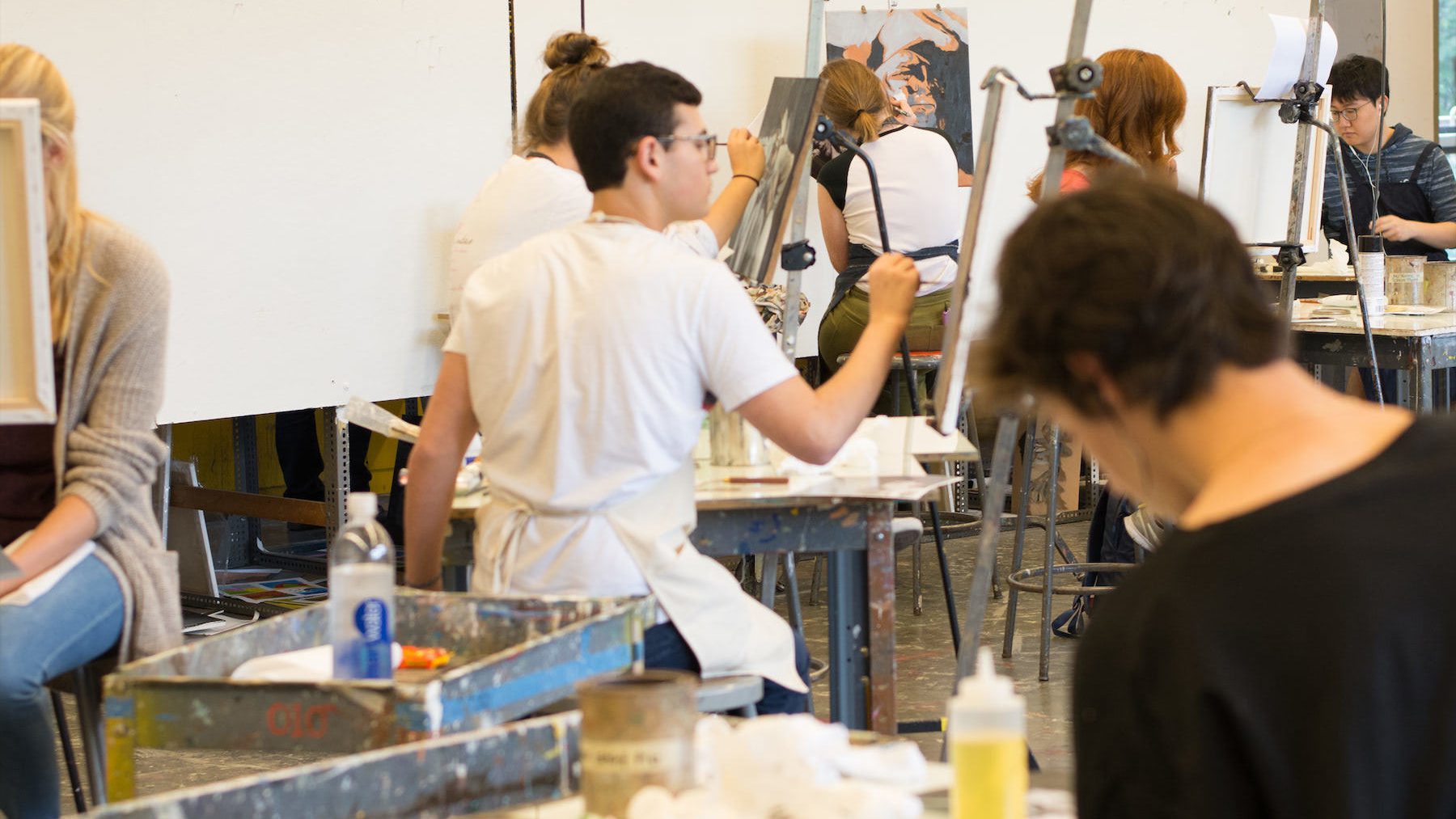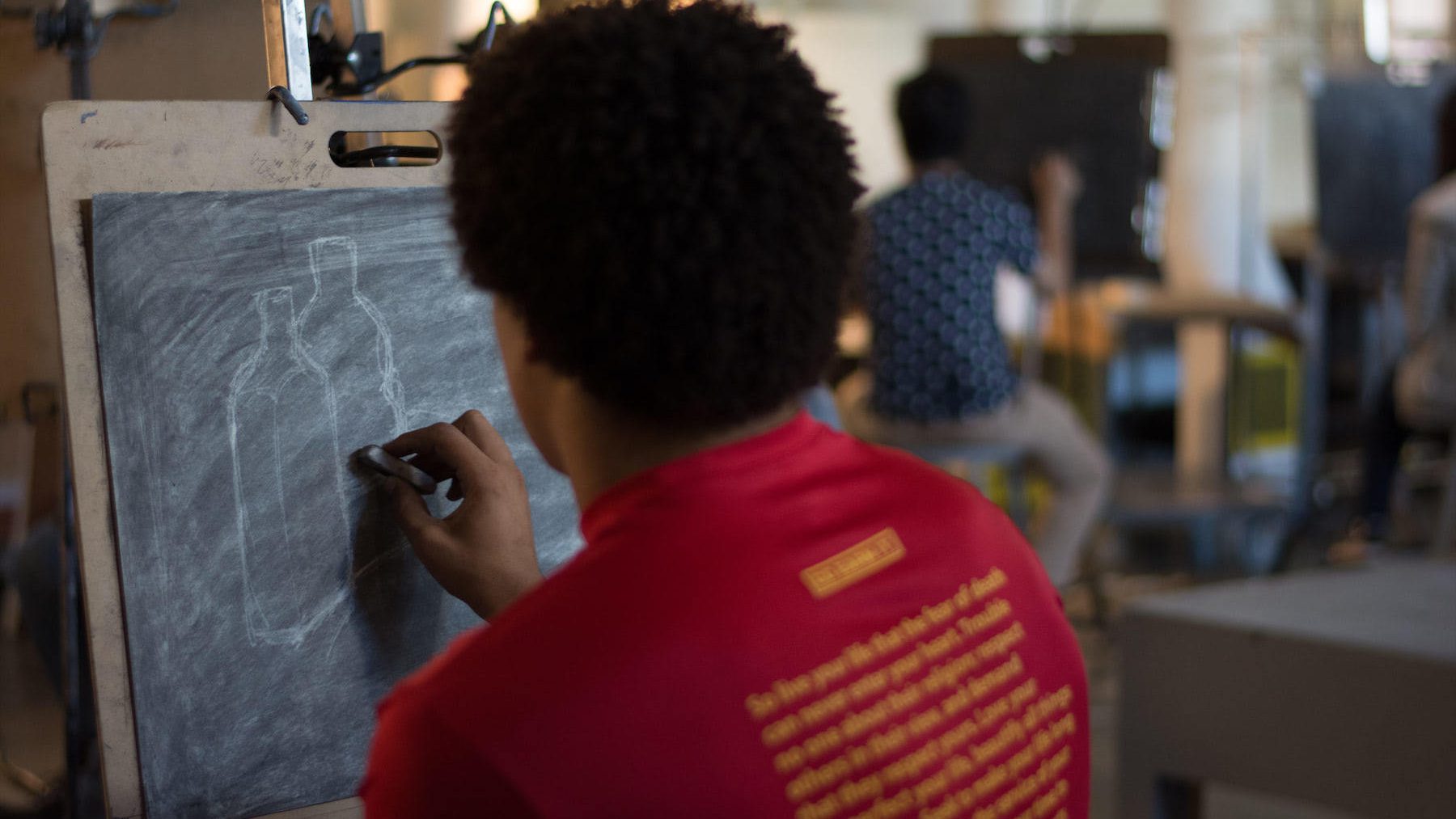Like the BFA degree, the BA focuses on creativity, critical thinking, project development, community engagement and collaboration, and mastery of technique and craftsmanship.
The BA degree is well-suited to students who anticipate graduate or professional school not directly related to art and design; to students whose interests in art and design and other educational pursuits are equally strong; or to those students who wish to integrate other educational pursuits with their visually creative work.
Curriculum
| Stamps Courses | 59 credits |
|---|---|
| Required Studio Courses | 21 |
| Elective Studio Courses | 21 |
| Required Academic Courses | 14 |
| Stamps Elective Course | 3 |
| Non-Stamps Courses | 69 credits |
|---|---|
| Elective Academic Courses | 69 |
| Milestone Requirements | no credit |
|---|---|
| Sophomore Review |
Total Credits: 128
Required Studio Courses
Foundation Studios
During the first and second years, BA students complete a series of required Foundation Studio courses. These courses provide a foundation of skills in a wide variety of physical materials and processes.
| Course Title | Course # | Credits |
|---|---|---|
| Studio: Drawing 1 | ARTDES 100 | 3 |
| Studio: Drawing 2 | ARTDES 105 | 3 |
| Studio: 2D | ARTDES 115 | 3 |
| Studio: 3D | ARTDES 120 | 3 |
| Studio: 4D | ARTDES 125 | 3 |
| Creative Process Strategies | ARTDES 130 | 3 |
| Second Year Studio | ARTDES 220 | 3 |

Elective Studio Courses
Students begin taking Elective Studio courses during their second year. These courses allow students to explore and develop specific areas of interest. The seven Elective Studios (21 credits) are 200 to 400 level courses taken from the second through the fourth years of study.
- One course must be an Engagement Studio (ARTDES 310 – 319)
- Two courses must be at the 200- level
- Two courses must be at the 300- level
- One course must be at the 400- level
- The one remaining elective studio can be any level
Three credits (1 course) of Elective Studios may come from other UM schools or departments. Studio courses taken abroad during approved Stamps study abroad programs are considered as ARTDES credits.
Elective Studio courses vary each semester.

Required Academic Courses
Stamps academic and experiential requirements are designed to engage students in both the history of art and design and the current practice of emerging artists. The Penny Stamps Speaker Series brings respected emerging and established artists/designers to the School to conduct a public lecture and engage with students.
Students in the BA program must take three required Stamps Academic courses. To view more information about Stamps Academic courses for upcoming semesters, visit our course guide.
| Course Title | Course # | Credits |
|---|---|---|
| Art & Design in Context | ARTDES 150 | 3 |
| Art & Design History | ARTDES 151 | 3 |
| Stamps Lecture Series | ARTDES 160 | 8 |
Stamps Elective Course
Students choose one additional three-credit Stamps course to fulfill their BA degree requirements. This elective can be selected from any Stamps academic or studio course.
Elective Academic Courses
Students in the Stamps School participate in the rich intellectual and academic life of a top tier university by taking University Academic courses. The Stamps School requires liberal arts coursework, but also allows for elective choices. Students may undertake coursework to complete a minor in an academic area or they may tailor their academic selections to complement their studio practice or other career goals.
U‑M’s Liberal Arts Requirements are designed to develop basic familiarity with the three traditional components of liberal arts — humanities, social sciences and natural sciences; to enhance analytical reasoning; to encourage empathy with other cultures; and to understand contemporary environmental issues. Students must earn at least three credits in each specific area of the liberal arts, but may use one course to meet two or even three requirements. Students may use required and elective courses in their pursuit of a minor. Students may use AP/IB credit to fulfill any of the academic requirements with the exception of First Year Writing. Questions about specific requirements should to be directed to the Smucker • Wagstaff Academic Programs Center staff.
| Requirement | Credits |
|---|---|
| First Year Writing (FYWR) | 3 |
| Social Science (SS) | 3 |
| Natural Science (NS) | 3 |
| Analytical Reasoning (MSA, QR/1, QR/2) | 3 |
| Environmental Studies (ENVIRON) | 3 |
| Race and Ethnicity (RE) | 3 |
| Upper-Level Writing (ULWR) | 3 |
| 2 Art or Design History/Theory/Criticism electives (ADHTC) | 6 – 8 |
Use the code next to the title (SS, NS, MSA, QR/1, QR/2, ENVIRON, RE, FYWR, ULWR) to locate courses that satisfy Liberal Arts Requirements on Wolverine Access.
Sophomore Review
In the Sophomore Review, students present their work to date to a committee of faculty members.
The Sophomore Review is an opportunity for students to pause and take stock of how far they have come and what they can do to become the creative practitioners they aspire to be. While the Stamps faculty is always available to offer advice and suggestions, the Sophomore Review formalizes this process. It serves as part of their professional development and prepares them for other important assessments, such as performance reviews in their careers and/or critiques in graduate school.
Sophomore reviews create an opportunity for:
Students to have in-depth reflection on achievements, challenges, and risks taken within the program.
Students to define ideas, interests and future plans, and receive faculty feedback and advice.
Faculty to assess the student’s work and progress to date and provide in depth mentoring and recommendations.
Work will be evaluated by the faculty committee according to the following criteria:
Evidence of visual skills
Evidence of making skills
Evidence of creative and design process strategies
Evidence of critical reflection
Understanding how work fits into context
Articulation of future goals
Presentation
Participation in the Sophomore Review is required, and unless they are dual degree students, students must participate in April of their sophomore year; they will receive a copy of the Sophomore Review report by email in May. These reviews represent a significant professional and creative milestone.
Study Abroad
Studying abroad with a program approved by Stamps prepares Stamps graduates to enter the globalized economy, makes them more competitive for graduate study, fellowship opportunities, and employment, and helps them to become informed global citizens. International study provides first-hand knowledge of other cultures, fosters creative insights and new life experiences, encourages independence and flexibility, and prepares students to negotiate difference, adapt to changing situations, and to solve problems from a new perspective.Learn more about study abroad opportunities.

